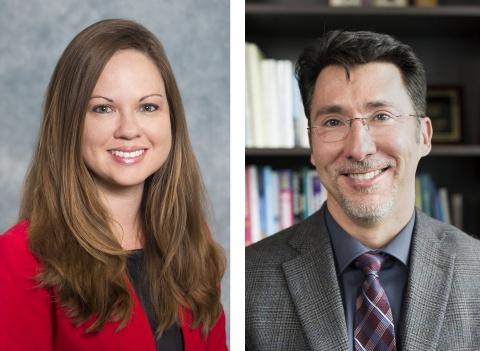
It’s no secret that the COVID-19 era is one like no other.
“We’re living in a challenging time, and we don’t want risk factors to go unchecked,” says Anthony Viera, M.D., MPH, professor and chair of the Department of Family Medicine & Community Health.
February is American Heart Month, and Viera says heart health should not be disregarded, even with the current focus on COVID-19.
As a provider at Duke Family Medicine Center, Viera helps individuals keep tabs on their heart health. He and department colleague Audrey Blewer, Ph.D., MPH, assistant professor of family medicine and community health, have several key messages this American Heart Month.
Cardiovascular health is serious and sometimes deadly.
“Heart health requires careful attention to blood pressure control and other risk factors such as high cholesterol and diabetes. Worse control of risk factors leads to worse health outcomes,” Viera says.
Survival for cardiac arrest (when the heart stops beating) is around 8 to 10 percent in the United States, Blewer says. Though, with the right knowledge, the survival rate can be increased.
“We can double or triple survival rates with CPR by pushing hard and fast on the chest,” Blewer says. “We call it bystander CPR.”
Blewer works closely with the American Heart Association as a scientific volunteer in addition to her role as an early career researcher in the Department of Family Medicine & Community Health.
CPR education is key for survival.
Most of us are spending the bulk of time at home due to COVID-19 curfews and restrictions and knowing what to look for during cardiac arrest and how to perform bystander CPR can save lives, especially those of our loved ones.
Those who are most at high risk for a cardiac arrest are older adults, specifically those with significant cardiovascular risk factors, Blewer says. She adds that because cardiac arrest occurs most often in the home (>75 percent), it is important to train close family members or loved ones in the lifesaving skills of CPR, as they may be the ones more likely to need to know how to act in these critical situations.
“To put it simply, cardiac arrest is when the heart stops beating,” Blewer says.
Both Viera and Blewer are passionate about CPR education because it saves lives. Viera stresses the importance of getting basic CPR training. In many cases, cardiac arrest is treatable if bystanders act quickly by pushing hard and fast on the victim’s chest—to the beat of “Stayin’ Alive”—until emergency services can arrive.
Viera advises the public not to be afraid and to act quickly if they witness a cardiac arrest. Calling 911 and initiating CPR can mean the difference between life and death. The American Heart Association recommends that, even during COVID-19, bystander CPR is important and should be initiated if the bystander feels comfortable doing so.
“The number of survivors are incredibly low, but we can change this,” Blewer says. “In most communities, less than half of cardiac arrest victims will receive bystander CPR. Doing something makes a difference and improves outcomes for this disease. You can’t hurt someone worse than dead.”
Blewer’s research also looks at who receives bystander CPR.
“Whites are more likely to get CPR. Black and Hispanic communities are not as likely to have someone step in,” Blewer says about her recent work. In addition, men are more likely than women to get bystander CPR in public locations.
Regular primary care check-ups are essential.
Even during COVID-19, Viera cites regular check-ups with a primary care provider as essential. A provider can help you know your risk and give advice about how to take care of your heart.
Making small lifestyle changes, such as increasing the amount of physical activity one gets in a day, can also make a big difference for your heart. Viera devotes a large amount of his research to such lifestyle changes, including how sleep matters for our cardiovascular outcomes.
This past year has made many of us appreciate our health, Blewer says. Show some love to your heart and members of the community by making a plan and staying safe.
A selection of recent heart-related research by faculty in the Department of Family Medicine & Community Health:
- Xu H, Farmer HR, Granger BB, Thomas KL, Peterson ED, Dupre ME. Perceived Versus Actual Risks of 30-Day Readmission in Patients With Cardiovascular Disease. Circ Cardiovasc Qual Outcomes. 2021 Jan;14(1):e006586.
- Blewer AL, Ho AFW, Shahidah N, White AE, Pek PP, Ng YY, et al. Impact of bystander-focused public health interventions on cardiopulmonary resuscitation and survival: a cohort study. Lancet Public Health. 2020 Aug;5(8):e428–36.
- Blewer AL, Putt ME, McGovern SK, Murray AD, Leary M, Riegel B, Shea JA, Berg RA, Asch DA, Viera AJ, Merchant RM, Nadkarni VM, Abella BS; CHIP Study Group. A pragmatic randomized trial of cardiopulmonary resuscitation training for families of cardiac patients before hospital discharge using a mobile application. Resuscitation. 2020 Jul;152:28-35.
- Blewer AL, Schmicker RH, Morrison LJ, Aufderheide TP, Daya M, Starks MA, et al. Variation in Bystander Cardiopulmonary Resuscitation Delivery and Subsequent Survival From Out-of-Hospital Cardiac Arrest Based on Neighborhood-Level Ethnic Characteristics. Circulation. 2020 Jan 7;141(1):34–41.
- Kronish IM, Hughes C, Quispe K, Viera AJ. Implementing Ambulatory Blood Pressure Monitoring in Primary Care Practice. Family Practice Management. 2020 May;27(3):19–25.
Lauren Westbrook is a communications intern with the Department of Family Medicine & Community Health. She is a senior at UNC-Chapel Hill, majoring in public relations.